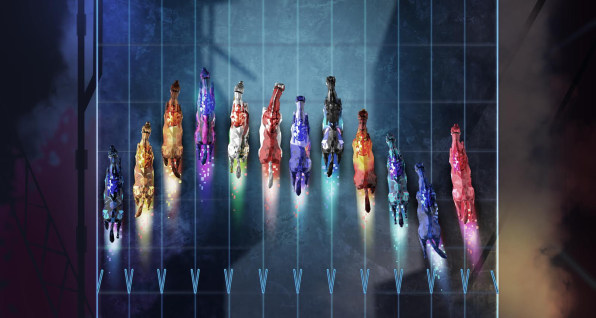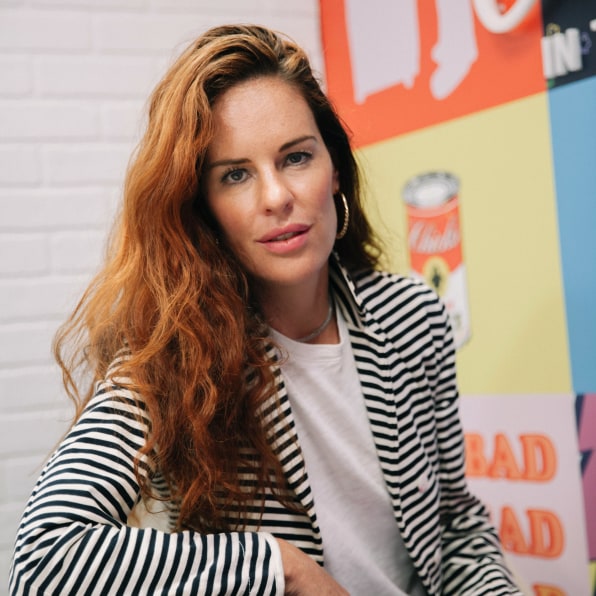A dozen pedigreed horses make their way down a racetrack as a crowd erupts in a low roar. Super Sal, a frisky colt, takes the early lead and looks like he might run away with it.
But as the pack stampedes through the 500-meter mark and starts to thin out, a mare named Fascoo begins to pull ahead. Wait! Here comes Ghost Hunter, a shimmering, khaki-colored steed. The horses’ rhythmic clip-clopping grows louder. Ghost Hunter whips through the finish line first, beating Super Sal by a fraction of a second.
This nail-biter isn’t any horse race you’ve ever heard of, nor is it even taking place in real life. It’s unfolding in a virtual world called Zed Run. This blockchain-based game lets anyone buy, breed, and race horses like Ghost Hunter 24 hours a day, on a course that’s suspended in space and surrounded by video-game atmospherics. The thoroughbreds, which look like digital mosaics with neon-colored bridles, never age, die, or even tire, after multiple races. Owners’ rights in the cyber ponies are held via a nonfungible token (NFT), certificates of ownership for digital images that grant the owner certain rights. When they win, they earn prize money paid out in Ether, the native cryptocurrency of the Ethereum blockchain on which Zed Run is built. By the summer, Zed had already sold $30 million in horses, and there are players who have become millionaires in the two years the game’s been live.

Zed Run is one of the hotter pursuits within the burgeoning “metaverse,” a concept that, alas, has an array of overlapping definitions as it’s been evangelized by Epic Games CEO Tim Sweeney and Facebook CEO Mark Zuckerberg, who renamed his company Meta in October. For our purposes, let’s state that the metaverse, which is also sometimes referred to as Web3, generally rests on two bedrock principles: Participants will own the digital content they create, a fundamental shift from Web 2.0, where a handful of powerful platforms, such as Facebook, own, control, and dictate everything. Eventually, Web3 will offer users a wholly realized virtual world, which users navigate as if playing a video game.
These efforts are all very new: There are likely only a few million people currently building and experimenting in this space. But aspects of what will make up the metaverse have burst into popular culture in 2021, such as the artist Beeple’s $69 million sale of an NFT of his work, and the popularity of NBA Top Shot, blockchain-based collectible digital trading cards. Overall, Web3’s growth is outpacing the internet’s development 25 years ago.

So when Zed Run went looking to raise money in 2021 to capitalize on its early success, one firm in particular was best poised to help it gallop past the Web3 cool kids and into public consciousness: The Chernin Group (TCG). The investment firm—founded, by former News Corp. president and COO Peter Chernin and Goldman Sachs alum Jesse Jacobs, in 2010—led Zed Run’s $20 million Series A funding round last July. The Los Angeles–based company, which has spent the past decade growing digital startups built around niche communities, including Barstool Sports, Hello Sunshine, MeatEater, Food52, and Crunchyroll, helped these brands expand well beyond media content into e-commerce, experiences, and more. “They’ve been really good at seeing trends early,” says media analyst and LightShed Ventures partner Rich Greenfield of TCG. “They realized that you could drive a retail business off of a media brand.”
Now TCG is expanding into the blockchain. The bet is that it can use the same proficiencies it’s developed in nurturing ideas that might sound ludicrous on first blush and turning them into hits. Startups like Zed Run are emblematic of TCG’s vision for how it can profit from the birth of Web3, which it sees as nothing less than the future of the internet. “We’re at this moment where crypto or blockchain companies can really start to go mainstream,” says Jarrod Dicker, an operating partner at TCG whom the firm brought on in June to focus on investing in this sector. “There’s a major opportunity for a firm to start to present itself in this space and bring that value around distribution, marketing, narrative, and brand building.” At present, as intriguing as experiences like Zed Run are, even its creators acknowledge that the metaverse has “so much friction right now,” as cofounder and CEO Chris Laurent says. “It’s almost like the dawn of the dotcom, when you were on a modem.”

Beyond Zed Run, TCG has already invested in other prominent startups in this world, including Dapper Labs (maker of NBA Top Shot) and OpenSea, both of which have introduced hundreds of thousands of new people to Web3 via their markets in digital collectibles. According to an SEC filing, the firm is raising a fund (of unspecified size) dedicated to investing in blockchain-based startups.
To Chernin, who has been a key participant in the entertainment industry’s shift to digital, the emergence of Web3 is a “paradigm shift” that TCG plans to be at the center of. “How big will it get?” he asks, rhetorically. “I have no fucking idea. But we believe there is going to be a huge opportunity.”
When Chernin speaks, he sounds more like a college professor than a guy who helped Rupert Murdoch build the entertainment conglomerate that gave the world The Simpsons and Home Alone. He has a low, slightly raspy voice, and an old-school gentility, apologizing profusely for being 10 minutes late to a phone call. But if you dare refer to him as someone who remains a cornerstone of Hollywood—through his Chernin Entertainment company, he still produces TV shows and films, such as 2019’s Ford v. Ferrari—he bristles. “I spent a lot of time in traditional Hollywood jobs,” he says, “but I always try to innovate.”
When Chernin left News Corp., in 2009—one of his last acts was stewarding a little movie called Avatar—the entertainment business appeared heartier than ever. But Chernin saw worrisome signs. DVD sales were dying, YouTube was on its way to racking up 2 billion views a week, and the iPhone was fostering alternative forms of entertainment. Even though cable TV was at its height, the prescient executive says he would tell his team at News Corp., “ ’If we all got drunk one night and dreamed up a business model that was the greatest fantasy of all time, we would have dreamed up the cable business.’ It was so ridiculous! We were getting paid billions of dollars for stuff that nobody was ever watching.”
Not interested in being around for the hangover, Chernin set up shop with Jacobs, a former investment banker who had been running content at the early online video company iFilm, and started hunting for new media investments. “They had a whole thesis early on, which was that the decentralization of content creation and distribution was going to make it possible for a new wave of creative voices to emerge,” says George Strompolos, whose network of YouTube creators called Fullscreen was Chernin’s first investment. At that moment, Chernin says, “No one in Hollywood knew anything about that stuff.”
The firm’s run of investments was nothing if not misunderstood in the early days. After a 2013 attempt to buy Hulu, which Chernin had helped found, did not pan out, “Basically the next day,” he says, “we woke up and said, ‘Okay, what’s the next big streaming platform?’ And believe it or not, it was Crunchyroll, a crazy, little Japanese anime thing in Northern California that had 120,000 subscribers. But we said, that’s an insane achievement, to have that many subs on their own. We closed a deal within a month.” Earlier this year, Sony acquired Crunchyroll, which now has 5 million subscribers, for $1.2 billion.
Other savvy bets followed. In 2016, TCG found two more nascent startups—one couldn’t be more different than the other—that it believed had the potential to be big. It backed actress Reese Witherspoon’s digital media company Hello Sunshine from the outset, installing one of its own executives, Sarah Harden, as CEO, and advising Witherspoon on producing an array of content aimed at adult women: podcasts, web series, and an online book club that now has 2.1 million followers. All of it was supported by a retail and merchandising business. When Hello Sunshine was sold last August to a media company backed by the Blackstone Group, it was valued at $900 million. (TCG sold its stake in Hello Sunshine and Crunchyroll to AT&T in 2018.)

Also in 2016, TCG became the majority owner of Barstool Sports when it was just a bro-ey, irreverent blog run by Dave Portnoy and “18 comedians,” says Mike Kerns, TCG’s third cofounder and partner. The company found Barstool a CEO, Erika Nardini, and helped it build a groundbreaking-at-the-time e-commerce business when a lot of advertisers were wary of its controversial content. By 2020, Barstool was valued at $450 million and had eclipsed ESPN in relevance among younger sports fans.
All of these companies are built around “tribes,” says Nardini, who “beat out 74 men” to win the job. “They’re almost anthropological in that regard, in that they are agnostic as to what the topic is. What they have a good eye for is engagement.”
I see this anthropology firsthand at 9 a.m. on a Wednesday in September, when members of TCG’s investment committee gather on Zoom to discuss its latest target: a gardening brand led by a charismatic millennial who posts entertaining and instructional videos on YouTube and Instagram about how to grow food. According to sources close to TCG, the firm has raised a new $1.2 billion fund to continue to find and back under-explored corners of Web 2.0 as it simultaneously seeks to adapt these same principles and strategies to take Web3 mainstream.
Luke Beatty, a preppy looking TCG partner who wears clear-framed glasses, explains how he and his team have spent the past six months talking to “over 150 different companies” in the gardening market, concluding that, “Outside of the big-box retailers and IGCs (independent garden centers), it’s highly fragmented, which gives us a lot of validation that we can build a great content-to-commerce business.”
There’s an uptick of interest among young people in growing food at home, as more millennials move to the suburbs and buy houses, Beatty says, pulling up a slide deck, which adds to an already robust group of 100 million consumers who spend $19 billion annually on gardening as a hobby. It’s a pocket of enthusiasts that’s hiding in plain sight, growing their own kale. What’s more, Beatty says, is the founder’s ambition. “He’s the only person we met who aspires to take over the world.” (Because the deal hadn’t closed, I agreed not to disclose the company’s name or any financial details.)
At this comment, the heads in the Zoom squares perk up. Chernin, who’s in his home office sporting a polo and a thin layer of stubble, leans into the camera. “Is there a close No. 2?” he asks. When he’s assured that their founder is “way ahead of the others,” Chernin keeps at it, asking whether traditional players like “the House & Gardens and the Martha Stewarts” pose any competitive threat. “Or are they just roadkill at this point?”
The conversation turns to how to grow the gardening company into a “house of brands.” Jacobs, who’s wearing a black T-shirt, his shoulder-length dark hair tucked behind his ears, describes how they might plug other content creators into the founder’s infrastructure and extend into flower gardening and homesteading. Merchandise (gardening tools, apparel), TV, and physical retail are also discussed. The road map is similar to that for MeatEater, the hunting-and-outdoor enthusiast site founded by Steven Rinella in which TCG has invested more than $50 million. MeatEater now has four e-commerce sites, a food blog, seven podcasts, 10 video series, a Netflix show in its 11th season, and more than half a dozen books. Jacobs says the gardener is “well equipped” to follow the same path.

According to Amanda Hesser, cofounder of Food52, which has doubled its revenues since TCG became a majority investor in 2018, the firm “values brand not as a symbol of a company, but actually as a relationship with its customers. They are very focused on building this long-term relationship with people, serving them well.”
Kerns, an affable former Yahoo exec who’s the only one wearing a button-down, brings up financials, explaining that TCG would be a majority owner, but that they would give the founder incremental ownership whenever the firm put in additional capital, so as not to dilute his share. “We recognize and respect that we’re just the investors,” Kerns had told me a few days earlier, relaying the message he gives founders. “We’re betting on your vision . . . your connection to your audience . . . your instincts. But then we’re gonna bet on ourselves that we’re gonna help you build and run this business.”
A few minutes before 10 a.m., it’s clear that the gardening investment is likely a go. The team turns to Chernin, who has the last word. “There’s an opportunity to dominate this category,” he says, clearing his throat. “But the one thing I’ll say is you have to go into this with enormous urgency about filling out those other e-commerce pieces. Our goal here is to try to figure out how to build a $100 million company in the next five years.”
“You could think about [the metaverse] like discovering a new continent,” says Dicker, a bearded millennial who was VP of innovation at The Washington Post and then became CEO of a blockchain startup.”People are buying land, setting up communities. There are social events, banks, and currencies.” The startups building pieces of this new society are growing at a pace that makes $100 million in five years seem dowdy.

Two of Web3’s breakout stars are TCG portfolio companies. Dapper Labs introduced hundreds of thousands of people to this world, its gateway drug being basketball stars making GIF-worthy dunks and plays in Top Shot video “cards.” The NBA Top Shot frenzy peaked in February with more than $224 million in sales volume, according to NFT data tracker Cryptoslam; through October 2021, that number exceeded $750 million. Then OpenSea, a marketplace for buying and selling NFTs, exploded in popularity, as it became the destination to launch and trade art projects. OpenSea’s gross merchandise volume in August was a reported $3.4 billion, more than marketplaces such as Etsy. The startup garnered an estimated $236 million in fees that month alone, according to a report from VC firm Variant.
What’s so exciting to the participants in this world is that most of the value accrues to them. Dapper Labs acknowledged in February that 95% of that sales volume goes to users. As Zed Run’s Laurent puts it, the metaverse is “the dawn of a new experience. We’re shifting the power into the hands of the consumer.” Not everyone shares this view: There are still scams being pulled, and some critics have gone so far as to suggest that all NFTs are multilevel marketing schemes. “Technology is often several steps, or years, ahead of where the regulation is,” TCG’s Jacobs acknowledges.

Because blockchain-based companies are so creator-centric, their emerging business models are looking a lot like the media businesses TCG has helped build, embracing merchandise, sponsorships, events, and gaming. Having TCG as an investor, Laurent says, has helped Zed Run make sponsorship deals with Atari, Stella Artois, and Nascar. On the day I spoke with Laurent, he shared that a few hours earlier the company had signed a deal with Netflix. A racetrack based on the Netflix film The Harder They Fall, a Western starring Idris Elba (which debuted on November 3), will be created in Zed Run. “We’ll be bringing them into our game, our world,” Laurent says.
TCG is also advising Zed Run on branding and community building. A forthcoming esports tournament that will stream on YouTube, Facebook, and Twitch will help on those fronts. And TCG is connecting the company with sports gambling advisers in the U.S. Today, the game is about owners racing horses; all spectators can do is watch. Wagering would allow more people to be part of Zed Run and introduce them to racing their own stable. Down the line, Chernin believes that it will “move toward negotiating with some of the sports leagues,” suggesting that Zed may expand beyond horse racing.
The ultimate goal, from TCG’s perspective, isn’t just to popularize Zed Run—though, there’s that. It’s to accelerate the adoption of the next phase of the internet, where there will be endless opportunities for creators and a new world of niches to turn into valuable digital brands.
“We’re finding the founders and platforms that aren’t building for the 10 million MetaMask wallet users,” says Dicker, citing the name of a program people use to store crypto assets, “but the 3-billion-plus people who haven’t found their way into this environment.”

No Comments Yet